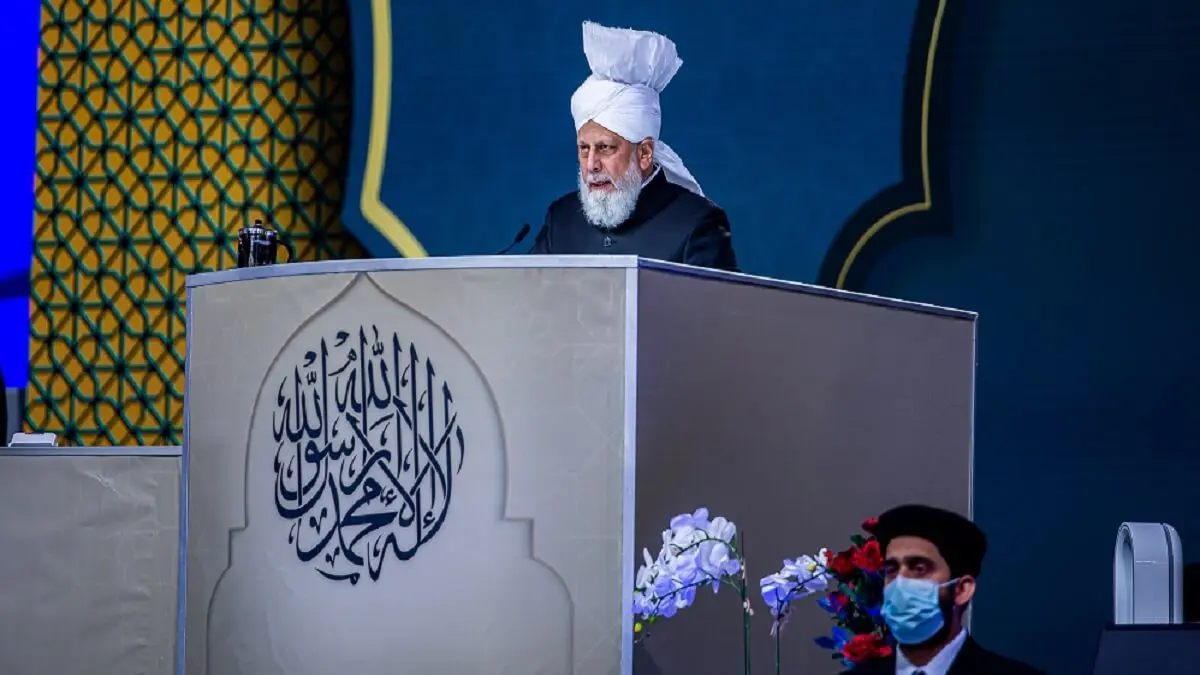The Philosophy of Islamic Teachings (16)

The Spiritual Conditions
The third consideration is: What are the spiritual conditions? We have already stated that according to The Holy Quran the source of spiritual conditions is the soul at peace, which elevates a person from the stage of moral being to that of divine being, as Al'lah the Glorious says:

"And you, O peaceful soul! Return unto thy Lord well pleased with Him, and He well pleased with thee. Enter, then, with My chosen servants. Enter into My Garden." (89:28-31).
It must be remembered that the highest spiritual condition of a man in this life is attained when he finds rest in God, and centres all his contentment, ecstasy and happiness in God. This condition is called heavenly life. At this stage a man is granted heavenly life in this world as a reward for his perfect sincerity, purity and faithfulness. Others are striving for a future Paradise, but he enters Paradise in this very life. On reaching this stage, man finds that the worship prescribed for him is indeed the nourishment that sustains his soul, on which his spiritual life largely depends, and he also finds that its consummation is not delayed until the next life. All the reproaches on the part of the self-accusing soul about man's savage life, those reproaches which do not succeed in fully awakening in him the longing for virtue, nor in generating in him a repugnance for his impure desires, nor in giving him the power to hold fast to virtue always, are now transformed by this impulse which constitutes the beginning of the soul's development in peace. By reaching this stage, man becomes capable of complete prosperity.
All his selfish passions wither away, a strengthening breeze begins to blow over his soul, and man looks back with remorse upon his former weakness. At this stage, man's nature and manners undergo a total transformation, and man is removed from his former condition. He is cleansed and purified, and God inscribes in his heart the love of virtue and delivers him, by His own hand, from the impurity of vice. The forces of truth break into the citadel of his heart, and good occupies all the fortifications of his nature. Truth is proclaimed the victor, and falsehood, having laid down its arms, flees. The hand of God is upon his heart, and man walks always under the shadow of God.
God Most High has pointed out all this in the following verses:

"They are those in whose hearts Al'lah has engraved true faith and whom He has strengthened with His inspiration" (58:23).

"Al'lah has made you to love faith, has made it beautiful to your hearts, and has made disbelief, wickedness and disobedience hateful to you. Those indeed are they who follow the straight path. By the grace and favour of Al'lah. For Al'lah is All-Knowing, All-Wise." (49:8-9).

"Truth has come and falsehood has vanished. Undoubtedly, falsehood quickly vanishes" (17:82).
All this pertains to the spiritual condition attained by man in the third stage. No one can aspire to true perception before reaching this condition. That God inscribes faith in his heart with His own hand and strengthens him with the Holy Spirit means that no one can attain true purity and righteousness without divine help. In the stage of the self-accusing soul, man repents again and again, and yet he stumbles again and often despairs, considering his condition hopeless. He remains in this situation for a certain period, and when the chosen time comes, there descends upon him, night or day, a light possessing divine power. With the descent of the light, he experiences a wondrous change, perceives the control of an unseen hand, and beholds a world full of wonders. It is then that he becomes aware of the existence of God, and his eyes are filled with a radiance they did not possess before.
How to discover that path, how to acquire that light? Let it be known that in this world every effect has a cause, and behind every action there is someone who acts. There is, for the acquisition of all knowledge, a way called the straight path. In this world nothing is achieved without obeying the rules laid down in this respect by nature from the beginning. The law of nature teaches us that for the achievement of any purpose there is a straight path, and the purpose can only be achieved by following the straight path. For example, if we are sitting in a dark room, the right way to get sunlight is to open a window facing the sun. By doing so, sunlight will immediately enter the room, illuminating it. It is evident, therefore, that in order to attain the love of God and true grace, there must be some window, and there must be a right procedure for acquiring pure spirituality. Then we must seek the right way to spirituality just as we seek a right way to achieve any other purpose.
That method does not consist in trying to find God only by our own reasoning, following the paths of our own choosing. The doors that can only be opened by His mighty hands will not yield to our logic or our philosophy. We cannot find God the Everlasting and Sustainer by our own resources. The only right way to achieve such a purpose is first to dedicate our lives and all our faculties to God Most High, and then to devote ourselves to prayers to find Him. In this way we will find God through God Himself.
The most excellent prayer that teaches us about the time and occasion of prayer and paints a picture of spiritual zeal is that which God the Gracious reveals to us in the opening chapter of the Holy Quran. It is set out below.
An Excellent Praye

"All praise is due to Al'lah, Lord of all the worlds" (1:2).

"In His clemency He takes care of our welfare, before we perform any act and after we act, He rewards our deeds with His mercy" (1:3).

"He is the One Sovereign of the Day of Judgment, and He has not yielded to any other on that Day"

"O You who comprehend all these attributes! You alone do we worship and implore Your help in all our things" (1:5).
The use of the plural pronoun in this context indicates to us that all the faculties are engaged in His worship, and prostrate themselves at the threshold of His will. All men, by virtue of their inner faculties, are not individual but multiple entities, and the prostration of their faculties before God is the condition that is called "Islam".

"Guide us in Your straight path, and set us firmly on it; the path of those who have received Your graces and Your favours." (1:6)

"And not from those who have incurred Your wrath, nor from those who went astray and did not reach You." (1:7).
Amen.
These verses reveal to us that divine blessings and graces are only bestowed upon those who sacrifice life for the sake of God and dedicate themselves fully to Him and, submitted to His will, beseech Him to grant them all the spiritual mercies that man can receive, bringing them closer to God, to meet Him and to hear His words. With this supplication, they worship God through all faculties, avoid sin and prostrate themselves before the divine threshold. They guard against vice, and turn away from the ways of God's wrath. As they seek God with unwavering resolve and perfect sincerity, they find Him, enabling them to drink deeply of the cup of the knowledge of God.
The perfect and true grace which lifts man into the spiritual world depends upon steadfastness, which implies such a high degree of sincerity and faithfulness that it cannot be broken by any trial. It signifies a close relationship with the divine, a bond that cannot be severed by the sword, nor devoured by fire, nor damaged by any calamity. The death of loved ones or separation from them must not weaken this bond, nor must the fear of dishonour affect it, nor must painful death, drive away the heart in the least. Thus the gate is very narrow and the way very difficult. Alas, how difficult it is!
(lpbD) - peace and blessings of God be upon him.
[We will continue with the 17th installment, where we will continue to develop the theme of "The Spiritual Conditions".]




